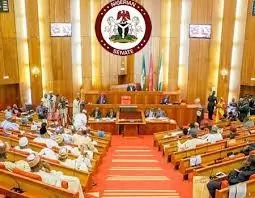6 Functions of the Nigerian Senate
The law making body of the Federal Republic of Nigeria is the National Assembly. The country operates a bicameral legislature, this is to say that there are two chambers of the National Assembly.
Section 47 of the 1999 Constitution provides that ‘There shall be a National Assembly for the Federation which shall consist of a Senate and a House of Representatives.
👉 Relocate to Canada Today!
Live, Study and Work in Canada. No Payment is Required! Hurry Now click here to Apply >> Immigrate to CanadaThe Nigerian Senate is the upper chamber of the National Assembly, the senate is comprised of 109 members, three from each if the 36 states of the federation and one from the Federal Capital Territory, Abuja. A member of the Senate is referred to as senator or simply lawmaker.
Read Also: Functions of Nigerian National Assembly

Like every other law making body, the chief function of the Nigerian Senate is to make laws, there are some other functions which have been ascribed to it. The functions of the National Assembly will be discussed below.
1. Law Making
This is the primary function of the Nigerian Senate is to make laws for the good and smooth running of the government of the Federation.
It should be noted that there are two houses of the National Assembly, when a bill is passed in the Nigerian senate, it is sent to the other house to be passed.
A bill is a proposal for a law or a law in embryo. When a bill originates in the senate, it passes through four different stages before it can be considered passed, the first is 1st reading, where the bill is introduced to the house, 2nd reading where the bill is actually discussed and purpose is relayed to the house, committee stage where a committee is set up for further deliberations on the bill, the last is third reading where the bill will be passed by a simple majority of members.
If the bill passes in the Senate and is sent to the house of representatives to be passed, if the bill so passes in the other house, the bill is presented to the president for assent, the president shall make known within thirty days whether he assents or withholds his assent.
If the presidents assents, the bill shall become a law. If however the president withholds his assent, the bill may be passed by each of the houses, if the bill passes, the bill shall become a law without the assent of the president. For the bill to pass at this time, two-third majority is required.
👉 Relocate to Canada Today!
Live, Study and Work in Canada. No Payment is Required! Hurry Now click here to Apply >> Immigrate to CanadaRead Also: Functions of the Federal Government of Nigeria
2. Correction of Defects in Laws
By the provisions of section 88(2)(a) of the 1999 Constitution, the Senate is also empowered to correct any defects in respect of existing laws.
Recently some amendments were made to the Companies and Allied Matters Act
3. Approval of Judicial Appointments
There exist three arms of government to ensure that there is separation of powers and checks and balances.
Section 231(1) of the Constitution provides that ‘The appointment of a person to the office of Chief Justice of Nigeria shall be made by the President on the recommendation of the National Judicial Council subject to confirmation of such appointment by the Senate.’
The position of the Chief Justice is the highest judicial office in the country, any appointment made by the president must be confirmed by the Senate alone.
Other judicial positions from the president of the Court of Appeal to Chief Judge of Federal High Court must be confirmed by the Senate. ( Section 238(1), Section 250(1) of the 1999 Constitution).
4. Approval of Other Federal Appointments
Besides the approval of appointments of judicial officers, the Senate is also empowered to approve and confirm other appointments made by the executive arm.
The president is empowered by the Constitution to appoint ministers of the government of the Federation, such appointments is subject to confirmation by the senate. Section 147(2) of the 1999 Constitution provides that ‘Any appointment to the office of Minister of the Government of the Federation shall, if the nomination of any person to such office is confirmed by the Senate, be made by the President.’
It should be noted that this power of confirmation is that of the Senate alone and not generally of the National Assembly.
Read Also: 10 Problems of Nigerian Politics and Possible Solutions
The Constitution also establishes some Federal Executive bodies such as;
a. Code of Conduct Bureau;
b. Council of State;
c. Federal Character Commission;
d. Federal Civil Service Commission;
e. Federal Judicial Service Commission;
f. Independent National Electoral Commission;
g. National Defense Council;
h. National Economic Council;
i. National Judicial Council;
j. National Population Commission;
k. National Security Council;
l. Nigeria Police Council;
m. Police Service Commission; and
n. Revenue Mobilization Allocation and Fiscal Commission.
The chairmen and members of these bodies shall be appointed by the president subject to the confirmation of the Senate.( Section 154(1) of the 1999 Constitution).
Read Also: 10 Problems of Insecurity in Nigeria and Possible Solutions
5. Control of Public Funds
The Senate is also empowered to control the amount of public funds that will be spent and the manner in which they will be disbursed.
Section 80(3) of the 1999 Constitution provides that ‘No moneys shall be withdrawn from any public fund of the Federation, other than the Consolidated Revenue Fund of the Federation, unless the issue of those moneys has been authorised by an Act of the National Assembly.’
Sub section 4 further provides that ‘No moneys shall be withdrawn from the Consolidated Revenue Fund or any other public fund of the Federation, except in the manner prescribed by the National Assembly.’
The president shall also present the estimates of revenue expenditure for the next following year which is usually called the Appropriation Bill before the National Assembly for confirmation and approval. (Section 81 of the 1999 Constitution.).
6. Removal of the President or Vice President
The Senate and the National Assembly generally has a special role to play in the removal of the president or vice president from office.
The procedure for the removal of the president or vice president is contained in section 143 of the Constitution. The process starts by the notice of allegation in writing that the president is guilty of gross misconduct signed by at least one third of the members of the National Assembly.
Read Also: 9 Functions of Local Government in Nigeria
The president of the senate shall make copies of the allegation to be served on every member of the National Assembly within seven days.
Within fourteen days, each house of the National Assembly shall resolve by motion whether the allegation should be investigated. The motion will be sustained if it is supported by two-thirds majority of the members of the National Assembly.
If the motion is passed, the president of the senate shall request the Chief Justice to appoint a panel of seven persons of unquestionable integrity, not members of the public service, legislative house or any political party to investigate the allegation.
The panel shall within three months report to each house of the National Assembly whether the allegation has been proved. If the panel reports that the allegation has not been proved.
The process comes to an end. If otherwise, within fourteen days, the National Assembly shall adopt the report of the committee by a resolution of not less than two-thirds of the members of the National Assembly.
If the motion is supported by the two-thirds majority, the President or vice-president in question stands removed from office.
It should be noted that the final resolution of the Panel or the National Assembly cannot be entertained in any court (sectionof43and0) of the 1999 Constitution.)
The position of the Senate is crucial to the attainment of the objectives of the government. They exercise a level of control and interfere in the affairs of the other arms of government in the overall interest of the country.

